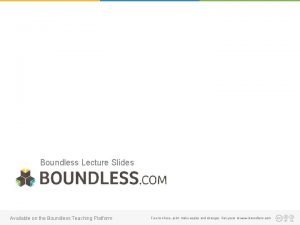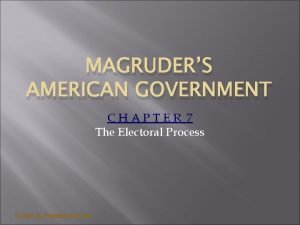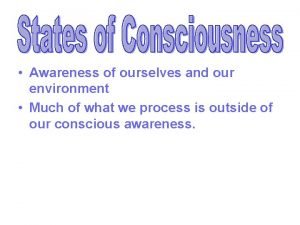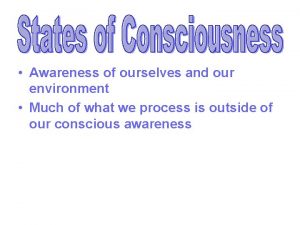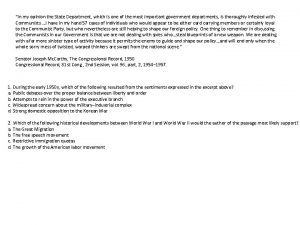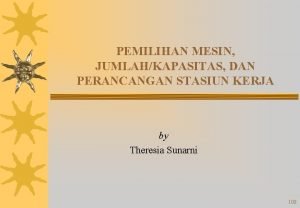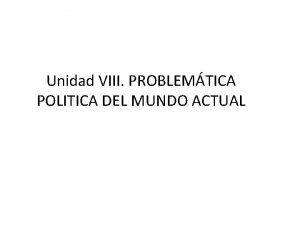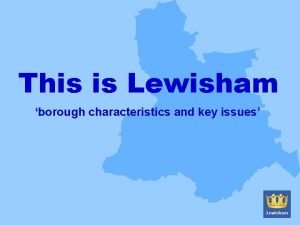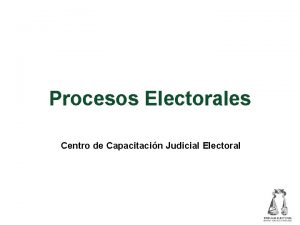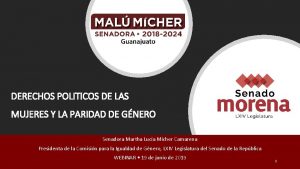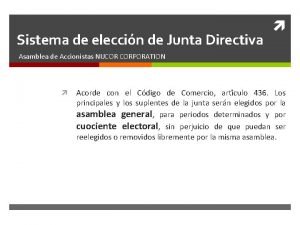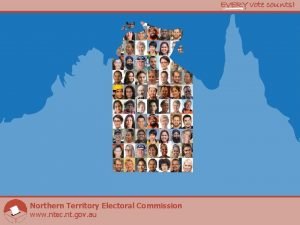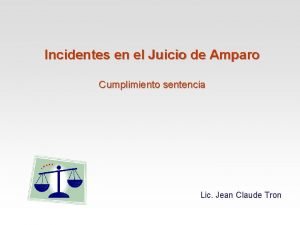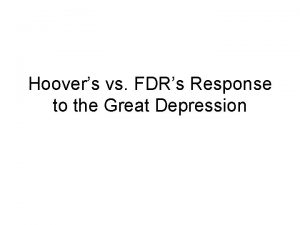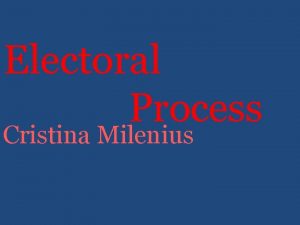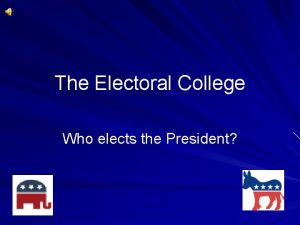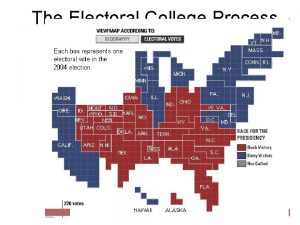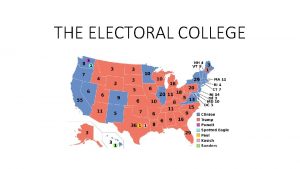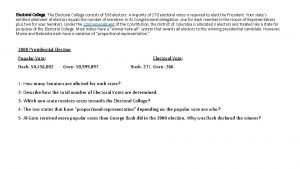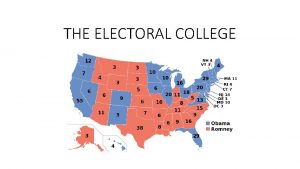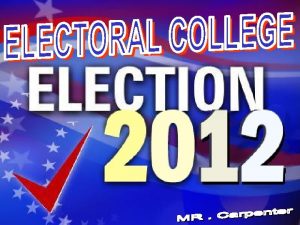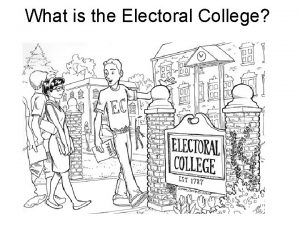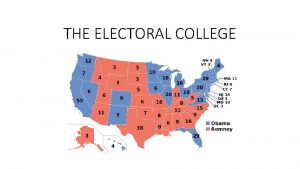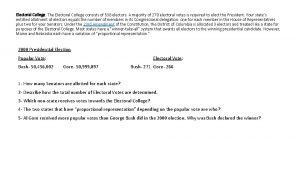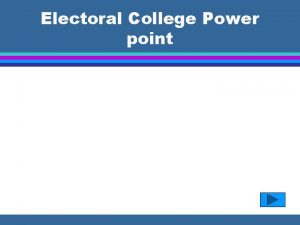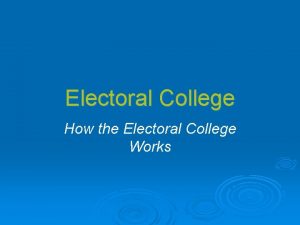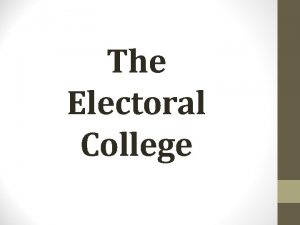ELECTORAL COLLEGE AND ELECTORAL PROCESS WHO ELECTS OUR

















- Slides: 17

ELECTORAL COLLEGE AND ELECTORAL PROCESS

WHO ELECTS OUR LEADERS? � House = directly elected by US citizens ALWAYS � Senate = directly elected by US citizens NOW (17 th Amendment) � President = Electoral College (12 th Amendment) � � Founding Fathers weren’t sure a democracy would work and created Electoral College so states could “choose” Regular chance to replace leaders (accountability)

ELECTORAL COLLEGE � Each state receives electoral votes based on population � 270 magic number for candidates - if no one reaches 270, vote taken in House of Representatives � Twelfth Amendment � outlines the purpose of the Electoral College and electoral process for President and Vice President � essentially 51 different elections telling state electors how they will cast their vote � 700 proposed changes to the Electoral College (more than any other subject)



Proportional Plan - candidate would receive same share of State’s electoral vote as his share of popular vote Direct Popular Plan – allow candidate who won the popular vote to become President; hurts small states or least populated states National Bonus Plan - would keep much of current system intact but weight the winner-take-all feature toward winner of popular vote

WHO ARE THE ELECTORS? � People elected by their state political parties � Can’t be an elector if you currently hold a federal office at time of election � Faithless Electors - Electors who vote against the will of the people in the state election - 24 states have laws punishing faithless electors


THE ROAD TO THE PRESIDENCY � “Test the waters” Visit talk shows � make appearances in first two primary states IA and NH � Form an exploratory committee to assess verbal and monetary support � � Create a campaign organization without the aid of the major political parties Fundraising, grassroots (especially in early primary states) � Once candidate becomes the nominee, then the party rallies behind the candidate with money and other forms of support �

WINNING THE NOMINATION: PRIMARIES AND CAUCUSES � Most common way for a candidate to gain a nomination in the party primaries and held before the general election Primaries - (1/3 to ½ of voters in general election) � Progressive Era reform to give citizens more of a voice in nominating candidates for President � � Open Primary - voters don’t have to declare their party to vote � Closed Primary - voters do have to declare their party to vote (Missouri)

WINNING THE NOMINATION: PRIMARIES AND CAUCUSES � Caucus “gathering of tribal chiefs” � Party members meet to discuss & choose nominee (delegates) � Local Regional State � Delegates go to national convention to cast “vote” representing will of the people � � Caucuses have low voter turnout because you have to stay throughout the whole process to get your voice heard; in a primary, you just have to turn in a filled out ballot and your done! Iowa Caucus explained https: //www. youtube. com/watch? v=6 u. Fo. Cc. IGd. Xg

NATIONAL CONVENTION � National Convention is used to select the party’s Presidential and Vice Presidential candidates Held in late summer after primaries and caucuses � Speeches given to unify the party and adopt the party’s platform � Official vote taken to nominate a candidate from the party for the office of President � � Party platform - ideas and principles (planks) that each party writes out to define the major issues of their party and unite the party



PRESIDENTIAL ELECTION � After the National Convention, candidates promote the platform of each party in an attempt to win the general election � Campaign � attempt by candidates to convince you to vote for them � Citizens United v. FEC (2010) - Supreme Court case which equated campaign spending to protected 1 st Amendment right of free speech; allows for unlimited expenditures by a candidate if the money comes from political action committees, unions, corporations and interest groups � Vote on the first Tuesday in November � winner take all system; 270 electoral votes needed to


2012 CAMPAIGN SPENDING PRESIDENTIAL
 Electoral college changes
Electoral college changes Compromise
Compromise Chapter 7 the electoral process
Chapter 7 the electoral process Our awareness of ourselves and our environment
Our awareness of ourselves and our environment Our awareness of ourselves and our environment is called
Our awareness of ourselves and our environment is called Awareness of ourselves and our environment
Awareness of ourselves and our environment Awareness of ourselves and our environment
Awareness of ourselves and our environment The 1964 electoral map above illustrates the
The 1964 electoral map above illustrates the Election machine
Election machine Geografía electoral
Geografía electoral Lewisham electoral roll
Lewisham electoral roll Geografía electoral
Geografía electoral Materia electoral
Materia electoral 1992 electoral map
1992 electoral map Ejemplo cuociente electoral junta directiva
Ejemplo cuociente electoral junta directiva Northern territory electoral commission
Northern territory electoral commission Tipos de incidentes en materia electoral
Tipos de incidentes en materia electoral 1932 electoral map
1932 electoral map
